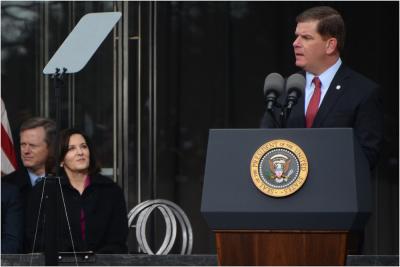April 2, 2015
 Mayor Walsh speaks at EMK Institute dedication: Photo by Chris Lovett
Mayor Walsh speaks at EMK Institute dedication: Photo by Chris Lovett
“Welcome to Kennedy country.”
Amid an all-star team of political luminaries who spoke at Monday’s dedication of the EMK Institute – including a man who has already carved a spot for himself on the Rushmore of presidential orators – it was left to Mayor Marty Walsh to capture the significance of the setting itself: “Here on Columbia Point, by Dorchester Bay, in the City of Boston.”
Most speakers accurately, but incompletely, zeroed in on the institute’s Boston locale. But this memorial building – and the larger, older sibling that sits more prominently next door – did not land in Dorchester by chance. The Kennedy family’s roots in this neighborhood run deep, but they are similarly connected to communities in the North End, Brookline, Cambridge, and on the Cape. But it is Dorchester that is now the permanent home to the modern-day Kennedy compound. It happened because the Kennedy family chose this place – and because Dorchester chose to embrace them.
“As a child I walked this shore and I listened as my mother, an Irish immigrant, shared stories of the Kennedy family standing up for people like us,” Walsh said in his remarks. He recalled meeting Ted Kennedy on the sidewalk outside the senator’s mother’s old address on Ashmont Hill. Rose Kennedy’s childhood home at the corner of Welles Avenue and Harley Street had long since been torn down, but the senator was there in 1992 to dedicate a plaque noting its former spot.
Walsh recalled his encounter with “Honey Fitz’s grandson” in his remarks: “ He wasn’t larger than life that day. He was down on the corner to honor his mother like any good Irish boy from the neighborhood would.”
The mayor ticked off a few other Dot connections to Teddy. The nation’s very first community health center, the Geiger-Gibson, is also located on Columbia Point, the mayor explained. The center got it start with federal dollars that Sen. Kennedy secured back in the 1960s.
He didn’t say it explicitly, but Walsh’s line about Dorchester being “Kennedy country” was met with knowing nods from the scores of union chiefs and assorted politicos seated in the rows in front of him. When Kennedy endured his sharpest political challenge – from a surging Mitt Romney in 1994 – it was to Dorchester’s union halls and street corner standouts that Kennedy and his operatives looked for a counter-offensive. He found them in ready supply because, as Walsh said, “Take it from a union laborer: American workers never had a better friend.”
But the bond that cemented the Kennedy connection to this precise place on Columbia Point had happened long before that. It was more like forty years ago, in fact, when Marty Walsh was a still a little kid in a three-decker on Taft Street. Ted Kennedy and the late president’s wife Jackie were hunting for the right place to locate the presidential library in the early and mid-1970s. It had been a decade since John Kennedy’s assassination and the crates filled with thousands of artifacts, photos, and papers needed a suitable home. Most thought it would naturally go to the banks of the Charles River on the campus of the Kennedy clan’s alma mater. But Harvard University’s institutional plans were sidetracked by NIMBY opponents from the tony homes off of “the square.”
 JFK Library Belongs in.... DorchesterAcross town, Dorchester folks saw an opportunity to present – and campaign for – an alternate site. They printed up 12-cent bumper stickers, held rallies, and staged a “road show” event on the UMass Boston campus that brought out thousands of people clamoring for the JFK Library to choose us.
JFK Library Belongs in.... DorchesterAcross town, Dorchester folks saw an opportunity to present – and campaign for – an alternate site. They printed up 12-cent bumper stickers, held rallies, and staged a “road show” event on the UMass Boston campus that brought out thousands of people clamoring for the JFK Library to choose us.
The odds were stacked against Dorchester, remembers Steve Graham, who was the young president of the Pope’s Hill Civic group at the time.
“God, we were lined up against Harvard and Derek Bok, the Kevin White administration, and the Boston Globe wasn’t very receptive to us, either,” Graham remembered in an interview with the Reporter in 1999. “I think back and say, ‘If we’d known more, we might not have even tried.”
Of course, it didn’t help matters much that one of the city’s most dangerous public housing developments – the old Columbia Point projects – loomed along the coast within spitting distance of the potential library site. But the tip of the Columbia Point peninsula was, and is, a spectacular place, with sweeping views of the sea that the Kennedy brothers loved. The president’s widow, his surviving brother, and his closest advisors shared the vision for what it could become.
On the afternoon of Nov. 24, 1975, it was Steve Graham who got a telephone call with the good news: “Steve, the library’s coming to Dorchester and we want you to come over and make the announcement,” the voice told him. It was Ted Kennedy on the other end of the line.
Now, as Marty Walsh noted on Monday, there is another special place on our waterfront where “generations of children from Dorchester, from Boston, from all over New England, America and the world, will learn what we learned from Senator Kennedy: How they can make their voices heard, fight for their case, keep the hope alive, and make sure the dream shall never die.”
Welcome home.


